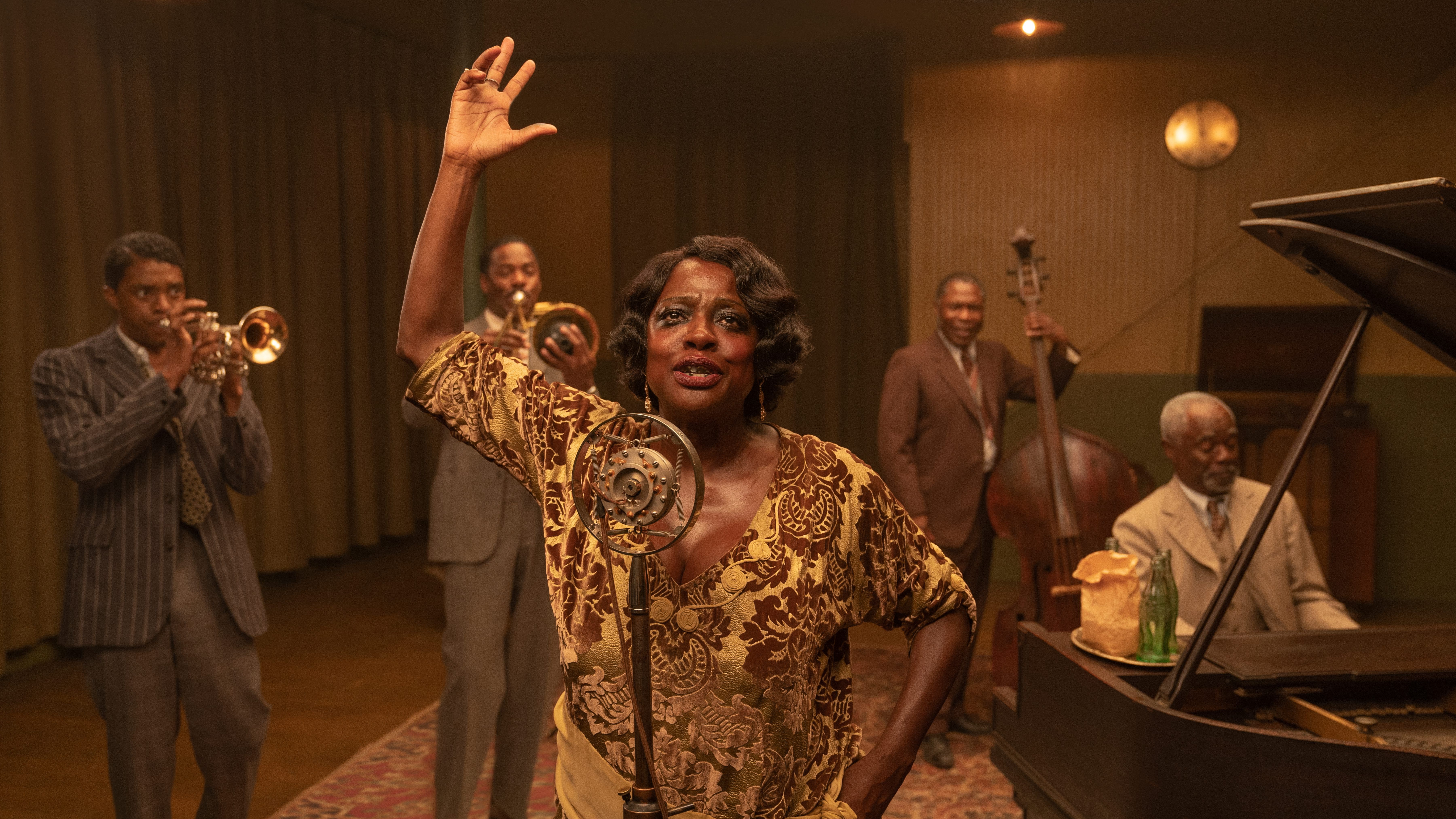
Even under normal circumstances, Netflix’s Ma Rainey’s Black Bottom would be one of the most anticipated films of the Oscar season. The second adaptation of playwright August Wilson’s 10-play Century Cycle produced by Denzel Washington, it features an awards-worthy turn from Viola Davis and the late Chadwick Boseman’s final performance. In short, it has a lot going for it. And while much of Ma Rainey’s Black Bottom meets or exceeds expectations, its failings can make it an ultimately frustrating experience.
Wilson is arguably one of the greatest American playwrights of the last century, so, it’s no surprise that the text itself (adapted by Ruben Santiago-Hudson) is one of the film’s biggest assets. Set in 1920s Chicago, it takes place over one day as the titular, real-life blues singer, Ma Rainey (Davis), and her band make records of her biggest songs. Among the band members is Levee (Boseman), a young, arrogant trumpet player striving to hit it big on his own.
The plot, which takes place almost exclusively in the recording studio, is relatively simple: the characters must finish recording the songs despite numerous hiccups. As a result, it’s largely a character study that allows Wilson–and by extension, director George C. Wolfe–to explore blackness in America. There is perhaps no better example of the synthesis of character and ideas than in the scene where Ma Rainey talks about power.
Up to this point, her behavior has repeatedly threatened to derail the recording session completely, most recently as she refuses to start until she has a couple of ice-cold Cokes at the ready. However, as she explains to her band leader, Cutler (Colman Domingo), her prickly demeanor and uncompromising behavior aren’t just diva antics, they’re her only means of wielding power in a world set up to exploit her. As she puts it, her manager Irvin (Jeremy Shamos) and the records’ producer Sturdyvant (Johnny Coyne) may be fuming over her outburst, but they have to comply to get what they want—and she’s going to make sure she doesn’t get screwed over in the process.
It’s a brilliant monologue, but it’s elevated by the way Davis performs it. With gold teeth, deliberately messy makeup and her skin constantly glistening with sweat, Davis might be unrecognizable if not for the signature gravitas she brings to Ma Rainey. The character doesn’t have to yell to get what she wants—though she occasionally does. Rather, it’s the intensity of her gaze or the deliberate, sure way she speaks that convey her immovability and confidence and Davis has rightly received Oscar buzz for her choices. However, excellent as Davis is, the film really belongs to Boseman.
In every scene, we’re reminded of what a movie star Chadwick Boseman was. The handful of pseudo-musical numbers we see are some of the film’s best moments, but perhaps its most transcendent comes early, as Levee soft-shoes, sings and plays a few notes on his trumpet. Boseman is effortlessly charming and cool in that scene and as it’s the audience’s true introduction to the character, it makes the moment when Levee turns serious later quite surprising. That said, it’s not a flaw in Boseman’s performance that makes his character’s turn a little jarring, it’s the way the film presents it.
Pushed by the other band members’ teasing, Levee suddenly becomes angry and emotional, arguing that they have no idea who he is by revealing a traumatic experience from his childhood. For much of the scene, the camera is trained only on Levee’s face and Boseman performs the monologue beautifully, breaking open the character’s arrogance to reveal the pain and insecurity beneath. The scene is so powerful, that the viewer wants to sit with it a moment to consider everything it suggests. Instead, the film jumps right into another pseudo-musical number where piano player, Toledo (Glynn Turman), muses over a metaphor where he compares black people in America to stew.
Admittedly, putting these two scenes directly next to each other is part of the text. They’re in conversation and it wouldn’t make sense to separate them. However, by showing Toledo’s monologue in shots where he is the only character in frame, not providing a visual or verbal transition between the scenes or even ensuring that they are tonally matched, the film suddenly feels as if it’s skipped something. Unfortunately, that’s not the only time Ma Rainey’s Black Bottom feels episodic in a way that leaves the whole movie feeling a bit scattered.
On a stage, it would be easier to watch the story flow from one beat to the next. If you could take these exact performances and see them live, the text would feel expansive, a slice of a time and place that would suggest an entire world just offstage. But as presented here, choices like the constant insert shots of Chicago’s bustling streets–with their obvious CGI and punctuating sound effects–shrink Wilson’s words to fiction, leaving the viewer constantly aware that it’s watching actors on sets.
Still, as frustrating as the filmmaking may be, a lot viewers probably won’t even notice because the performances are uniformly incredible. Frankly, Boseman and Davis are such marvels that many will probably want to rewatch Ma Rainey’s Black Bottom all over again the second the credits roll. And, watching it again, all those frustrating choices seem like nothing compared to the truth and power in the performances.

